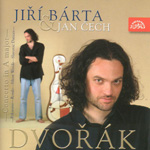Jirí Bárta and Jan Cech present Dvorák’s “first” Cello Concerto in A in its original version for cello and piano (the more famous one we all know and love is technically “No. 2”). The Concerto was commissioned in 1865 by cellist Ludvík Peer who then took the score out of Bohemia, after which it did not surface again until the 1920s. The work is known today primarily through Jarmil Burghauser’s orchestration, which included revisions (as well as cuts) by cellist Milos Sádlo (type Q4919 in Search Reviews). Dvorák’s unabridged original is a good deal longer, running to almost 56 minutes in performance, allowing the composer’s long-breathed thematic complexes take their time rounding their course. This works well in the first-movement exposition, where Bárta’s gloriously robust tone and Cech’s fulsome, firm-fingered playing sing out the irresistibly beautiful tunes.
However, the development tends to drag on, making it easy to get lost in Dvorák’s seemingly endless modulations (stretching the movement to more than 24 minutes). But you almost don’t mind, given the rapturous playing and Supraphon’s solidly three-dimensional and dynamically true recording. The Andante cantabile actually is the finest movement–spare in utterance yet deeply felt, it anticipates the more mature slow movements of Dvorák’s later years. The finale returns to the lavishly prolific style of the first movement (some of the repetitive material would be cut in Burghauser’s version), but here the music’s buoyant rhythmic energy makes its 21 minutes pass quickly. Still in all, this is a compelling performance of an important work in the Dvorák canon.
Dvorák’s smaller works for cello and piano (included on a second disc) find Bárta and Cech no less persuasive. Their heartfelt renditions of Silent Woods, Polonaise in A, and Rhondo in G, are balanced by their roughhousing in Slavonic Dance No. 8, which, removed of all its brightly-colored woodwinds and glittering percussion, sounds like the kind of down-and-dirty country dance Dvorák might have heard in his native village. In sum, this is a collection of wonderful music, wonderfully made–something no fan of Dvorák, or the cello, should be without.
































